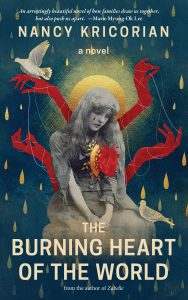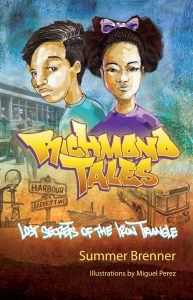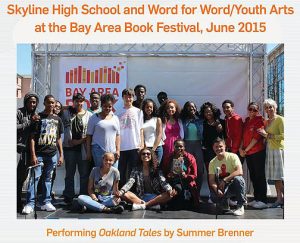“But even for history or memoir, which make the claim to being non-fiction, the facts take you only so far, and the writing—what to include, what to leave out, how to frame it—requires imagination. And in addition to imagination, it requires a ruthlessness in the editing process. You must learn to winnow away details that are not serving the narrative or your characters.” ~~Nancy Kricorian
Facts Feed Fiction in
The Burning Heart of the World
An interview with author Nancy Kricorian by B. Lynn Goodwin
 War has long-lasting effects on the men, women, and children who’re exposed to it even if they move away from the place where it happened. That’s certainly true of Vera, the narrator of Nancy Kricorian’s The Burning Heart of the World. Her war experiences growing up in Armenia trigger her reaction when 9-11 happens in the United States, and as the story progresses we find out how she lived and dealt with her fears. Because I was fascinated by the author’s knowledge of her subject, I asked her to answer the interview questions below. She shares some wonderful advice, complete with a plan of action, in the interview below.
War has long-lasting effects on the men, women, and children who’re exposed to it even if they move away from the place where it happened. That’s certainly true of Vera, the narrator of Nancy Kricorian’s The Burning Heart of the World. Her war experiences growing up in Armenia trigger her reaction when 9-11 happens in the United States, and as the story progresses we find out how she lived and dealt with her fears. Because I was fascinated by the author’s knowledge of her subject, I asked her to answer the interview questions below. She shares some wonderful advice, complete with a plan of action, in the interview below.
BLG: Tell us about yourself. When did you know you were a writer?
NK: I started writing poetry when I was in first grade, and my first “publications” were my poems being hung on the bulletin board in third grade for parent-teacher night. I began keeping a journal when I was in fifth grade, something that I have been doing to this day. In high school, I was the editor of the literary magazine. In college, I majored in Comparative Literature but took creative writing classes and did a senior fellowship project, which was a manuscript of poems.
I moved to New York City to earn an MFA in Poetry. While I was in grad school, my first poems were published in literary magazines. I started writing fiction after my grandmother died—my first novel, Zabelle, was a fictionalized account of her life as a genocide survivor and immigrant bride. Writing the book was a way of keeping her with me and of telling the stories she and her friends had relayed to me.
BLG: Did you get the idea for The Burning Heart of the World from a story in the newspaper, a family story, or somewhere else?
NK: The Burning Heart of the World is the fourth installment in what I have been calling “The Armenian Diaspora Quartet.” I grew up in the Armenian community of Watertown, Massachusetts and lived with my paternal grandmother, who was orphaned during the Armenian genocide. All four of my novels are about post-genocide Armenian diaspora experience, and the idea for The Burning Heart of the World grew out of stories that I heard from Armenian friends who grew up in Beirut during the Lebanese Civil War.
BLG: What was easiest about writing this book?
NK: What I loved most about working on this novel was the research that went into it. I traveled to Beirut three times where I walked around in the Armenian neighborhoods, exploring the churches, schools, cafes, bookstores, and homes. Friends there took me to meet key people in the community, including artists, photographers, writers, professors, priests, school principals, and newspaper editors. I interviewed dozens of people who had been in Beirut during the Civil War. I read extensively, and I made timelines, charts, and lists, filling sketchbooks with all kinds of notes, facts, photos, and maps. I had to familiarize myself with the place and its history so that I could reproduce its sights, smells, and sounds in the novel.
BLG: The research sounds wonderful, and it was clearly a wise choice. Was there anything that made this story hard to tell?
NK: The early drafts of this novel were bristling with the facts and details I had accumulated through my research. I realized that I needed to pare away the things that my protagonist, who in the Beirut section is a girl growing from age 10 to 15, would not have been aware of. It needed to be Vera’s story and from her point of view.
BLG: What tip(s) do you have for authors telling stories about their truths? What should be included and what should be left out?
NK: Doris Lessing wrote, “There is no doubt fiction makes a better job of the truth.” But there are many ways to get at truth. One is via facts—and I do all the research to make sure that I have the correct information to create a fictional world. But even for history or memoir, which make the claim to being non-fiction, the facts take you only so far, and the writing—what to include, what to leave out, how to frame it—requires imagination. And in addition to imagination, it requires a ruthlessness in the editing process. You must learn to winnow away details that are not serving the narrative or your characters.
BLG: Very good answer. How did you find Red Hen Press? Or do you know how your agent found them?
NK: My agent represents literary fiction, and her agency also reps poetry. Red Hen specializes in both of those genres, which is why it was on her radar.
BLG: Who did you reach out to for reviews, and what tips do you have for writers publicizing their own work?
NK: I reached out to a few people who had reviewed my previous books to see if they would be interested in the new novel. Because the book is focused on Armenian experience, I also reached out to the Armenian-American press. I would suggest that writers build a base by identifying a core audience that would be interested in their book—maybe that is an ethnic group that they belong to, or it could be bird watching clubs if they have written about birds, to name just two possibilities.
BLG: What else would you like readers to know and where can they learn more about you?
NK: Readers can find out more about me and my work at my website or by signing up for my Substack newsletter.
@@@
“…reading was a form of transport. And the writer had provided the means of this extraordinary journey.” ~~Summer Brenner
Sharing Your Writing Gifts
An Interview with Summer Brenner
Are you a member of Rotary International? In case you aren’t familiar with the organization, “it is a global network of more than 1.2 million neighbors, friends, leaders, and problem-solvers who see a world where people unite and take action to create lasting change.”

Summer Brenner, the author I interviewed for this article was recommended by a member of Rotary. Ms. Brenner had a unique way of getting students involved in a book about their community, which she called Richmond Tales: Lost Secrets of the Iron Triangle. She gave the students ownership, a sense of pride, and information about how a book comes together. It’s not a typical interview for this site, so enjoy this unique look at one of the ways that storytelling and education can intersect.
If you’d like to share your gift of writing or if you already are doing so, please read Summer Brenner’s story below.
BLG: Tell us when you decided to be a writer and how you proceeded.
SB: At a very young age, I was an avid reader. Consciously and mostly subconsciously, I realized that reading was a form of transport. And the writer had provided the means of this extraordinary journey. In other words, I’d gleaned something about the power of writing as a substrata of the actual story.
Later, in high school, we had assignments to write poetry. I found it exciting, both reading and writing poems. While many kids today will be asked to write their own poems, then it was unique. I soon began to write poetry on my own. And then continued to write.
BLG: How did you get involved in West County Reads and what does the organization do?
SB: In the early 2000s, I got a grant from the CA Council on the Humanities to be a ‘writer in community.’ I chose a low-income HS (in fact, a continuing high school) near downtown Richmond. The grant was to create incentive programs for kids to read/write better. Someone told that there was an organization of volunteers focused on literacy. Literacy was at the core of my grant. I found a contacts and went to a meeting. Almost immediately, I was asked to join the board.
Over the years, WCR engaged in very inventive projects: art contests about reading for kids, home calendars that listed local literary/library events, an annual literacy festival, distribution of 1000s of new/gently used children’s books. All of these efforts were successful because the local need was large and urgent.
BLG: How did you come up with the concept for Richmond Tales: Lost Secrets of the Iron Triangle? Can you pinpoint what inspired you?
SB: At WCR board meetings, incentives for reading were always under discussion. Some of us were aware of the national program, ONE CITY, ONE BOOK, an annual program that chooses an adult book for the community to read/discuss. We asked: what if we chose a children’s book instead? A children’s librarian, also on the board, and I set out to find a book that could serve the diverse community of Richmond and the environs. Our vague goals were to find a book that the whole family, and kids of different ages, would enjoy. At the time, Richmond students represented approximately 80 languages. We found books with diverse animals as characters, but they were too juvenile. Someone suggested that I write the book! (I’d already published a middle school novel about a homeless girl). Also, I’d begun research on Richmond for a novel. The decision to write the book myself meant it could be tailored for the specific community.
BLG: How and why did you find local students to help critique the manuscript and its characters?
 SB: In the very beginning, a staff member of Literacy for Every Adult program was going to be a partner for fundraising. I soon realized that I could apply for grants as an artist, which would require an institutional partner. The school district and Community Works (Oakland) became a partner in the project. I was fortunate to receive a grant from The Creative Work Fund. Its terms included funds for the district to develop a companion workbook; and for me to work in tandem at the target grade level to develop the main characters. I found a receptive principal and teacher; and after I had written the first few chapters, I went to the students for advice.
SB: In the very beginning, a staff member of Literacy for Every Adult program was going to be a partner for fundraising. I soon realized that I could apply for grants as an artist, which would require an institutional partner. The school district and Community Works (Oakland) became a partner in the project. I was fortunate to receive a grant from The Creative Work Fund. Its terms included funds for the district to develop a companion workbook; and for me to work in tandem at the target grade level to develop the main characters. I found a receptive principal and teacher; and after I had written the first few chapters, I went to the students for advice.
BLG: I’ve been told you have a template for anyone who wants to write a book like this. How do people get in touch with you to ask for a copy of the book?
SB: The concept for the template is that the narrative (characters, plot) of Richmond Tales can be transposed anywhere. In other words, I’ve stripped out Richmond placenames, streets, and history — and another locale’s placenames, streets, history, et al. could be dropped in. However, the time travel chapters (to the past/future) would require research to drop in the history of a place.
My hope is that a team of HS students could do the necessary research; and a combo of teachers, librarians, historians, a writer, et al. could manage filling in the template. At the moment, I’ve only created a template for the first 4 chapters, which I’ll gladly share with an interested party. To print actual books takes funding. However, the project could be simplified to pamphlet or online.
It’s hard to convey how successful the book has been in sparking a community-wide conversation about reading; and empowering for kids to read about their own place in different times. If a place was different in the past, can we transform it in the future?
BLG: That’s a great question. How did you and your publisher market the book? Is there a publisher that specializes in this type of book?
SB: Richmond Tales, Lost Secrets of the Iron Triangle and Oakland Tales, Lost Secrets of The Town(with crossover characters/themes) were not published by a traditional publisher but rather through grants. While they thrived beyond city limits, and won a state award from CTA (California Teacher’s Association), the specificity of the books would not have appealed to a commerical venture.
Both books were adopted by the respective school districts, and 1000s of copies were distributed in classrooms. There were articles in newspapers, and I was interviewed on radio and TV. There were theatrical presentations and the Richmond Literacy Fest. Word got around. When the grants ran out, and the books sold or given away, I reprinted them on Spark-Ingram and distributed them via Amazon.
BLG: What advice would you give writers searching for their unique voices?
SB: The only way to learn about how to write and what to write is practice. I find reading drafts aloud extremely helpful. I also recommend a daily physical discipline that can help instill daily mental discipline. There’s no doubt that patience and persistence are required. I try to learn from what I read; and enjoy what I write.
BLG: Tell us about your latest book, Dust, and what you discovered as you wrote the memoir. What’s your audience for that one? Has switching genres affected your career?
SB: I had a very troubled family. At the end of his life, my schizophrenic brother left Atlanta and came to live with me. I knew that I had to tell his story. The book was written in homage to him. This is my first nonfiction book.
However, I’ve written in other genres, such as poetry, crime, literary fiction, and of course, the books for youth. As for a career, I think that I prefer a practice. I will say that the memoir has gotten certain kinds of attention (including an essay in LITHUB June 18, 2024).
BLG: What else would you like us to know and where can readers find your books?
SB: There’s a website: www.summerbrenner.com. And Instagram with a few postings. Forthcoming are two poems is an anthology Woman, Life, Freedom: Poems of the Iranian Revolution. Some of my books (new/used) are available via bookstores or online. Usually, title and author are all you need. A word of caution about ‘The Missing Lover, 3 novellas: There is confusion at AMAZON about the correct ISBN.
BLG: I know that the glitch you describe isn’t one that authors can control.
You can find The Richmond Tales at https://www.amazon.com/Richmond-Tales-Lost-Secrets-Triangle/dp/0977974146 and learn about Summer Brenner’s extensive writing at http://www.summerbrenner.com/.
Every community has a history, and I can see where your project must have engaged large portions of the community. You’re a very experienced writer and I appreciate you sharing your knowledge with the readers of Writer Advice.



Please share the interview above with teachers who might be interested! Many thanks.